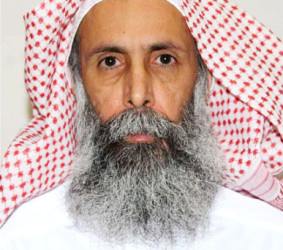RIYADH (Reuters) – Saudi Arabia executed a prominent Shi’ite Muslim cleric and dozens of al Qaeda members yesterday, signalling that it would not tolerate attacks, whether by Sunni jihadists or minority Shi’ites, and stirring sectarian anger across the region.

Hundreds of Shi’ite Muslims marched through Qatif district in Saudi Arabia’s Eastern Province in protest at the execution of cleric Nimr al-Nimr, an eyewitness said. They chanted “Down with the Al Saud!” the name of the ruling Saudi royal family.
Nimr, the most vocal critic of the dynasty among the Shi’ite minority, had come to be seen as a leader of the sect’s younger activists, who rejected the quiet approach of older community leaders for failing to achieve equality with Sunnis.
Most of the 47 killed in the kingdom’s biggest mass execution for decades were Sunnis convicted of al Qaeda attacks in Saudi Arabia a decade ago. Four, including Nimr, were Shi’ites accused of involvement in shooting policemen.
The executions took place in 12 cities, four prisons using firing squads and the others beheading. In December, al Qaeda in the Arabian Peninsula threatened to retaliate against Saudi Arabia for any execution of its members.
The move further soured relations between Sunni-ruled Saudi Arabia and its Shi’ite regional rival, Iran, which had hailed Nimr as the champion of a marginalised Shi’ite minority.
The website of Iran’s Supreme Leader, Ayatollah Ali Khamenei, carried a picture of a Saudi executioner next to notorious Islamic State executioner ‘Jihadi John’, with the caption “Any differences?”, and the powerful Revolutionary Guards said “harsh revenge” would topple “this pro-terrorist, anti-Islamic regime”. Saudi Arabia summoned the Iranian ambassador in response.
In Iraq, prominent religious and political figures demanded that ties be severed, calling into question fence-mending efforts by Riyadh that had been intended to boost a regional alliance against Islamic State militants.
However, the executions seemed mostly aimed at discouraging Saudis from jihadism after bombings and shootings by Sunni militants in Saudi Arabia over the past year killed dozens and Islamic State called on followers there to stage attacks.
After the executions, Islamic State urged its supporters to attack Saudi soldiers and police in revenge, in a message on Telegram, an encrypted messaging service used by the group’s backers, the SITE monitoring group reported.
Saudi Arabia’s ruling Al Saud family has grown increasingly worried in recent years as Middle East turmoil, especially in Syria and Iraq, has empowered Sunni militants seeking to bring it down and given room to Iran to spread its influence. A nuclear deal with Iran backed by Saudi Arabia’s biggest ally, the United States, has done little to calm nerves in Riyadh.
But Saudi Arabia’s Western allies, many of whom supply it with arms, are growing concerned about its new assertiveness.
EU foreign policy chief Federica Mogherini said Nimr’s execution risked “dangerous consequences” by further inflaming sectarian tensions in the region, and a German Foreign Ministry official said it “strengthens our existing concerns about increasing tensions and deepening rifts in the region”.
The simultaneous execution of 47 people – 45 Saudis, one Egyptian and a man from Chad – was the biggest mass execution for security offences in Saudi Arabia since the 1980 killing of 63 jihadist rebels who seized Mecca’s Grand Mosque in 1979.
The 43 Sunni jihadists executed on Saturday, including several prominent al Qaeda leaders and ideologues, were convicted for attacks on Western compounds, government buildings and diplomatic missions that killed hundreds from 2003-06.
The four Shi’ites were convicted of involvement in shootings and petrol bomb attacks that killed several police during anti-government protests from 2011-13 in which over 20 members of the minority sect were also shot dead by the authorities.
Under Saudi Arabia’s reading of Islamic law, such attacks are interpreted as “banditry”, carrying an automatic sentence of death followed by public display of bodies on gibbets.
Grand Mufti Abdulaziz Al al-Sheikh, the kingdom’s top religious authority, praised the executions as “just”.




